Depression among the elderly is a significant issue, arising from complex biological, psychological, and social factors exacerbated by aging challenges. Crisis intervention guidance and communication strategies are vital for support. Self-care strategies like exercise, mindfulness, and balanced diets reduce symptoms. Cognitive Behavioral Therapy (CBT) and Interpersonal Therapy prove effective in treating elder depression. Community outreach programs enhance social interactions. Burnout prevention strategies for healthcare providers ensure quality care when assisting elders with depression. Tailored therapy and crisis intervention are key to improving the overall health and quality of life for seniors suffering from depression.
Self-care practices play a pivotal role in maintaining mental wellbeing, especially among the elderly. This article delves into the complex issue of elderly depression, exploring its causes and profound impact on daily life. We present effective self-care strategies tailored to enhance mental resilience. Furthermore, we discuss therapeutic approaches specifically designed to overcome depression in elders, emphasizing the importance of personalized care. By integrating these insights, we aim to empower individuals to navigate their mental health journeys with greater ease and hope, especially through innovative Therapy for Elders Depression.
- Understanding Elderly Depression: Causes and Impact
- Integrating Self-Care Strategies for Mental Wellbeing
- Therapeutic Approaches to Overcome Depression in Elders
Understanding Elderly Depression: Causes and Impact

Depression among the elderly is a growing concern, often overlooked yet profoundly impactful. It’s crucial to understand that this isn’t merely a temporary mood swing but a serious mental health condition with various contributing factors. Elderly individuals may experience depression due to a complex interplay of biological, psychological, and social elements.
As people age, they might face the loss of loved ones, reduced mobility, or changes in their routine, all of which can negatively affect their mental wellness. The impact is significant, leading to a decline in overall health and quality of life. Therefore, providing appropriate therapy for elders’ depression is essential, utilizing crisis intervention guidance and communication strategies tailored to their needs. Effective support can help break the cycle, fostering a sense of belonging and purpose, crucial components in navigating the challenges that come with aging.
Integrating Self-Care Strategies for Mental Wellbeing

Integrating self-care strategies is a vital component of maintaining and enhancing mental wellbeing, especially among elders. In today’s fast-paced world, it’s easy to overlook one’s own needs while caring for others, leading to increased stress and potential mental health issues. Therefore, incorporating self-care practices into daily routines becomes essential for overall well-being. Activities such as regular exercise, mindfulness meditation, and maintaining a balanced diet can significantly reduce symptoms of depression and anxiety in the elderly population.
Therapy plays a pivotal role in supporting elders’ mental health journey. Cognitive Behavioral Therapy (CBT) is widely recognized as an effective approach to treating depression and fostering emotional intelligence. By participating in therapy sessions, individuals learn valuable coping mechanisms, enhance their problem-solving skills, and develop resilience. Moreover, public awareness campaigns focused on destigmatizing mental health issues can encourage elders to seek support and engage in self-care initiatives. Effective risk management planning for mental health professionals ensures that they prioritize their well-being while providing care, thereby creating a sustainable environment for both service users and practitioners.
Therapeutic Approaches to Overcome Depression in Elders

Depression among elders is a growing concern, but therapeutic approaches offer hope and effective solutions. Cognitive Behavioral Therapy (CBT) has proven successful in treating depression by identifying and changing negative thought patterns and behaviors. This form of therapy encourages individuals to challenge unhelpful thoughts and replace them with more realistic and positive ones. Additionally, interpersonal therapy focuses on improving relationships and social connections, which are vital for elder well-being.
Community outreach programs play a significant role in supporting elders’ mental health. Implementing these initiatives can provide regular social interactions, enhancing feelings of belonging and purpose. Furthermore, burnout prevention strategies for healthcare providers are essential to ensure quality care. Incorporating mindfulness meditation into their routines can help caregivers reduce stress and improve their resilience when assisting elders with depression.
In addressing elderly depression, a multi-faceted approach is essential. By understanding the causes and impacts outlined in “Understanding Elderly Depression,” integrating effective self-care strategies from “Integrating Self-Care Strategies for Mental Wellbeing,” and utilizing therapeutic approaches discussed in “Therapeutic Approaches to Overcome Depression in Elders,” we can significantly enhance quality of life for older adults. Specifically, incorporating tailored therapy for elders depression is crucial in navigating the unique challenges they face. Through these comprehensive steps, we foster not just mental wellbeing but also a vibrant and fulfilling aging experience.














